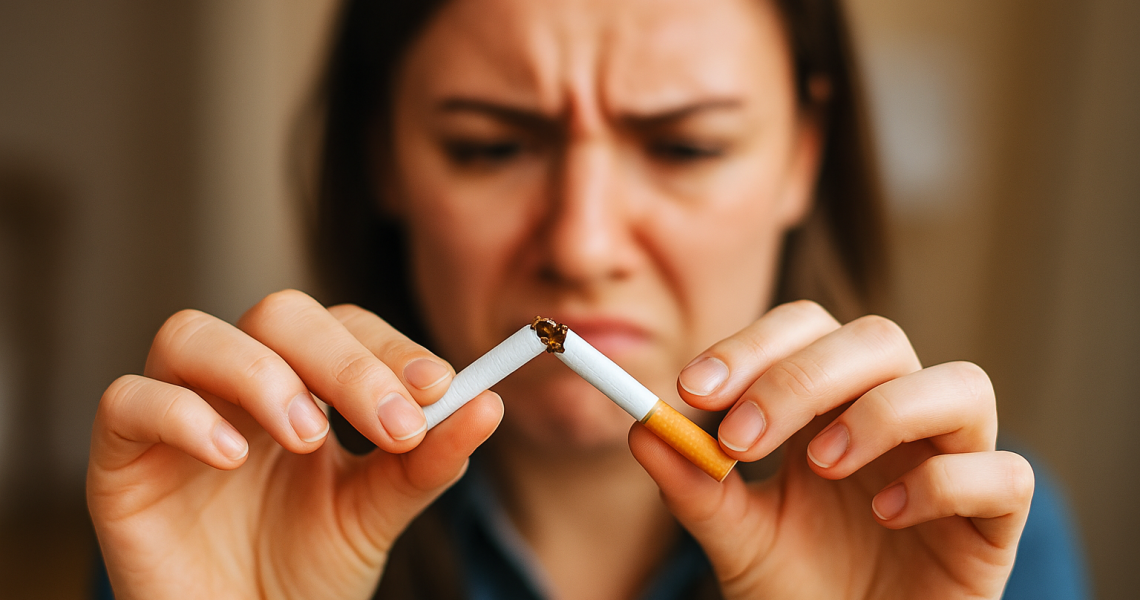Quitting smoking is undoubtedly one of the most powerful health decisions a smoker can make. Yet this courageous choice is almost always accompanied by a delicate period: smoking cessation. Fatigue, stress, irritability, cravings for cigarettes… the symptoms are many and sometimes difficult to manage.
But the good news is that not every symptom is an enemy, but a sign that your body is freeing itself from nicotine and tobacco.
In this article, we’ll explore in detail the effects of smoking cessation, how long they last, their physical and psychological consequences, and above all, how best to manage them. We’ll also see why the anti-smoking laser method proposed by MyLaserTabac is today a modern, gentle and effective alternative for maximizing your chances ofquitting for good.

Why do symptoms appear during smoking cessation?
Nicotine is a highly addictive substance. It acts directly on the brain, stimulating the release of dopamine, the neurotransmitter associated with pleasure and reward. When the nicotine dose drops sharply afterquitting cigarettes, smokers experience craving.
Chronic smoking permanently alters brain function. The result: the slightest absence of nicotine leads to undesirable effects that vary from person to person. Some experience extreme nervousness, others overwhelming fatigue, still others temporary depression.
In reality, all these symptoms are normal. They reflect the struggle between your desire tostop and the imprint left by nicotine addiction.
Smoking cessation symptoms: summary table
Here’s a clear picture of the main symptoms encountered during smoking cessation, with their origin, average durationand some practical advice.
| Symptom | Origin (effect of smoking cessation) | Average duration | Tips for coping |
|---|---|---|---|
| Fatigue | Decreased nicotine stimulation | 2 to 4 weeks | Get more sleep, engage in gentle activity, drink water |
| Anxiety / Stress | Nicotine withdrawal, dopamine imbalance | 2 to 6 weeks | Breathing, relaxation, MyLaserTabac laser sessions |
| Irritability | Decreased dopamine and serotonin levels | 1 to 3 weeks | Preventing those around you, practising physical activity |
| Mild depression | Brain adaptation without nicotine | 2 to 8 weeks | Psychological support, anti-smoking laser, avoiding isolation |
| Weight gain | Oral substitution, slower metabolism | Variable | Balanced diet, drinking water, regular activity |
| Sleep disorders | Nicotine withdrawal, internal agitation | 2 to 4 weeks | Sleep hygiene, limiting caffeine, relaxation |
| Craving | Sudden absence of nicotine | 2 to 12 weeks | Anti-smoking laser, patch or temporary nicotine substitutes |
| Cough / Irritated throat | Cleaning the respiratory system | 1 to 2 months | Hydration, patience, medical supervision if worsening |
| Concentration difficulties | Chemical rebalancing in the brain | 2 to 3 weeks | Frequent breaks, simple memory exercises |
| Digestive disorders | Readjustment of the autonomic nervous system | A few days | Hydration, fiber, gentle physical activity |
The physical and psychological effects of withdrawal
Fatigue and low energy
Fatigue is one of the first symptoms described by smokers going through withdrawal. Your body is no longer artificially boosted by nicotine, which makes you feel sluggish. This is a normal and temporary effect.
Anxiety, stress and irritability
Nicotine withdrawal causes nervous tension. Long-time smokers use cigarettes asa crutch in stressful situations. Without it, anxiety rises again.
Temporary depression
For some, theabsence of nicotine leads to a temporary state of depression. This is not inevitable, but it is an effect to be monitored. Medical follow-up or support in specialized centers can help.
Weight gain and increased appetite
Afterquitting, many smokers compensate by eating. The result: a few extra kilos. This is manageable with good prevention: choose healthy products, exercise regularly and avoid snacking.
Classic solutions: patches, substitutes and medications
For years, health authorities have been recommending nicotine replacement products to help peoplequit smoking. Patches, gums, lozenges, inhalers… they provide a reduced dose of nicotine to ease symptoms.
Other solutions exist, such as certain prescription drugs. However, these treatments can have their own side effects. As for the electronic vaporizer, it is sometimes used as a transition, but its use must remain supervised: it also contains nicotine and is not without risk.
Anti-smoking laser: a gentle, effective solution
Faced with the limitations of patches and other nicotine substitutes, an alternative is gaining in popularity: the anti-smoking laser.
👉 At MyLaserTabac, we use soft laser ear reflexology. In concrete terms, this involves stimulating precise points located on the ear, linked to the areas of the brain involved in addiction.
The benefits are many:
- Rapid reduction in cravings and craving.
- Reduced stress and better emotional management.
- No drugs, no side effects.
- Painless, natural method, suitable for any motivated person.
It’s an approach that has already helped thousands of smokers in France turn the page on tobacco, and maximizes your chances of success.
Preventing and coping better with withdrawal
Successful smoking cessation relies on a combination of tools:
- Regular physical activity: walking, cycling, yoga… to boost morale.
- Balanced diet to prevent weight gain.
- Psychological support or self-help groups in some centers.
- Access to reliable information to help you understand what lies ahead.
Each symptom has a limited duration. Keep in mind that after a few weeks, most of them disappear, and your health improves considerably.
Answering common objections
- “I’ll get fat.” → Not necessarily. With good dietary hygiene andactivity, weight remains stable.
- “I’ve already failed.” → Every attempt increases your chances of success.
- “I can’t cope with stress.” → The anti-smoking laser helps precisely to manage stress without cigarettes.
- “I’ve been smoking too much for too long.” → Even after years,stopping reduces the risk of cancer, improves breathing and circulation.
Conclusion: every symptom is a step towards freedom
Smoking cessation is a demanding stage, but every symptom is actually a sign that your body is freeing itself from tobacco.
You’ll regain energy, a new lease of life, a more radiant complexion, and above all drastically reduce your risk of smoking-related illnesses such as cancer and cardiovascular disease.
With the gentle method of anti-smoking laserby MyLaserTabac, you can turn this difficult period into a springboard to a new life.
👉 The time to act is now. Give your health and your loved ones the most precious victory of all: a life without cigarettes.
